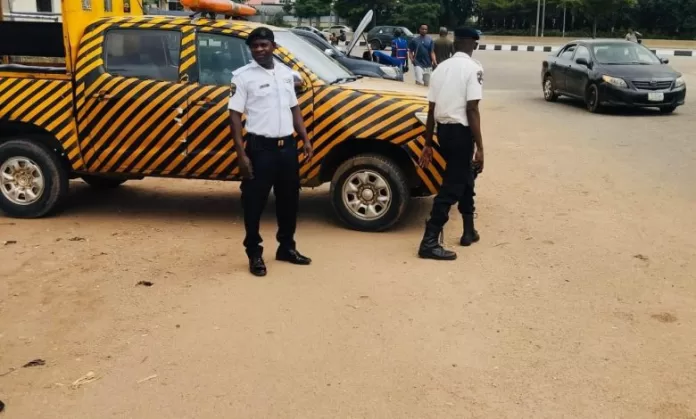The Federal High Court in Abuja has issued an order barring the Directorate of Road Traffic Services otherwise known as Vehicle Inspection Office (VIO) from further stopping vehicles on the road, impounding vehicles, or imposing fines on motorists.
The judge, Evelyn Maha, issued the order in a judgement on a fundamental rights enforcement suit FHC/ABJ/CS/1695/2023 filed by a human rights activist and lawyer, Abubakar Marshal of Falana and Falana chambers.
The judgment, delivered on October 2 by Justice Maha, stemmed from a fundamental rights enforcement suit filed by human rights activist and public interest attorney, Abubakar Marshal.
Justice Maha, in the judgment, agreed with the applicant’s contentions that there is no legal basis for the VIO and its officials to stop, impound, or confiscate vehicles or to levy fines against motorists.
The applicant, in a suit marked FHC/ABJ/CS/1695/2023, sued the Directorate of Road Traffic Services, the Director, Directorate of Road Traffic Services, Mr. Leo, the Area Commander, Directorate of Road Traffic Services (as of December 12, 2023), Onoja Solomon, the Team Leader, Directorate of Road Traffic Services, Jabi Area Command, and the Minister of the Federal Capital Territory as the 1st to 5th respondents, respectively.
In his originating motion, Marshal sought a declaration that the “1st to 4th respondents under the control of the 5th respondent are not empowered by any law or statute to stop, impound, or confiscate the vehicles of motorists or impose fines on motorists.”
He argued that such actions are “wrongful, oppressive, and unlawful, as it violates the fundamental human rights of such motorists to fair hearing, freedom of movement, and presumption of innocence, and is therefore unlawful by virtue of Sections 6(6)(B), 35(1), 35(8), and 41 and 42 of the Constitution of the Federal Republic of Nigeria, 1999 (as amended), as well as Articles 2(7)(b), 12, and 14 of the African Charter on Human and Peoples’ Rights.”
In her judgment, Justice Maha issued a restraining order against the respondents, preventing them and their agents from impounding or confiscating vehicles or imposing fines. She labeled such actions as “wrongful, oppressive, and unlawful.”
Furthermore, she granted a perpetual injunction to protect the rights of Nigerians, ensuring their freedom of movement, presumption of innocence, and right to own property without lawful justification.
The court reiterated that the relevant FCT authorities, who are under the control of the 5th respondent, are not empowered by any law or statute to stop, impound, or confiscate the vehicles of motorists and or impose fines on motorists. Justice Maha emphasized that the actions of the VIO and other relevant agencies against motorists violate their rights.
The judgment is seen as a significant judicial decision aimed at curtailing the excesses of VIOs and their powers to impose illegal levies and fines on motorists. The court held that “The 1st (Directorate of Road Traffic Services) to 4th Respondents under the control of the 5th Respondent (Minister of the Federal Capital Territory) are not empowered by any law or statute to stop, impound, or confiscate the vehicles of motorists and/or impose fines on motorists.”

READ ALSO: Court Grants 10 #EndBadGovernance Protesters N10m Bail Each
The ruling includes “an order restraining the 1st to 4th respondents, either through their agents, servants, or assigns, from impounding or confiscating the vehicles of motorists and/or imposing fines on any motorist, as doing so is wrongful, oppressive, and unlawful.”
Additionally, the court issued “an order of perpetual injunction restraining the respondents, whether by themselves, agents, privies, allies, or anybody acting on behalf of the 1st respondent, from further violating the rights of Nigerians to freedom of movement, presumption of innocence, and the right to own property without lawful justification.”
The court, in its judgment, issued a restraining order against the respondents, preventing them and their agents from impounding or confiscating vehicles or imposing fines, labeling such actions as wrongful, oppressive, and unlawful.
Justice Maha further granted a perpetual injunction to protect the rights of Nigerians, ensuring their freedom of movement, presumption of innocence, and right to own property without lawful justification.
The court, in its judgment, held that “The 1st (Directorate of Road Traffic Services) to 4th Respondents under the control of the 5th Respondent (Minister of the Federal Capital Territory) are not empowered by any law or statute to stop, impound, or confiscate the vehicles of motorists and/or impose fines on motorists.”
The court also issued “an order restraining the 1st to 4th respondents, either through their agents, servants, or assigns, from impounding or confiscating the vehicles of motorists and/or imposing fines on any motorist, as doing so is wrongful, oppressive, and unlawful.”
The court further issued “an order of perpetual injunction restraining the respondents, whether by themselves, agents, privies, allies, or anybody acting on behalf of the 1st respondent, from further violating the rights of Nigerians to freedom of movement, presumption of innocence, and the right to own property without lawful justification.”
Meanwhile,
In March 2021 judgement, the Court of Appeal in Asaba, Delta State, affirmed the verdict of the Delta State High Court nullifying the powers of the Delta State Government, through its VIOs, to demand the payment of levy and issuance of Road Worthiness Certificate in respect of private vehicles.
Delivering the lead judgement of the three-member panel of the Court of Appeal, Joseph Eyo Ekanem, said, “The Vehicle Inspection Officers (VIOs) went beyond the powers vested in them by the Law and the RTR by violently stopping the private vehicle of the Respondent on a public highway using menacing tactics and dangerous implements to demand a certificate of roadworthiness which the said vehicle is not required to have. Such conduct sends a wrong signal to the citizens who may adopt such strong-arm tactics as a means of settling disputes.”

